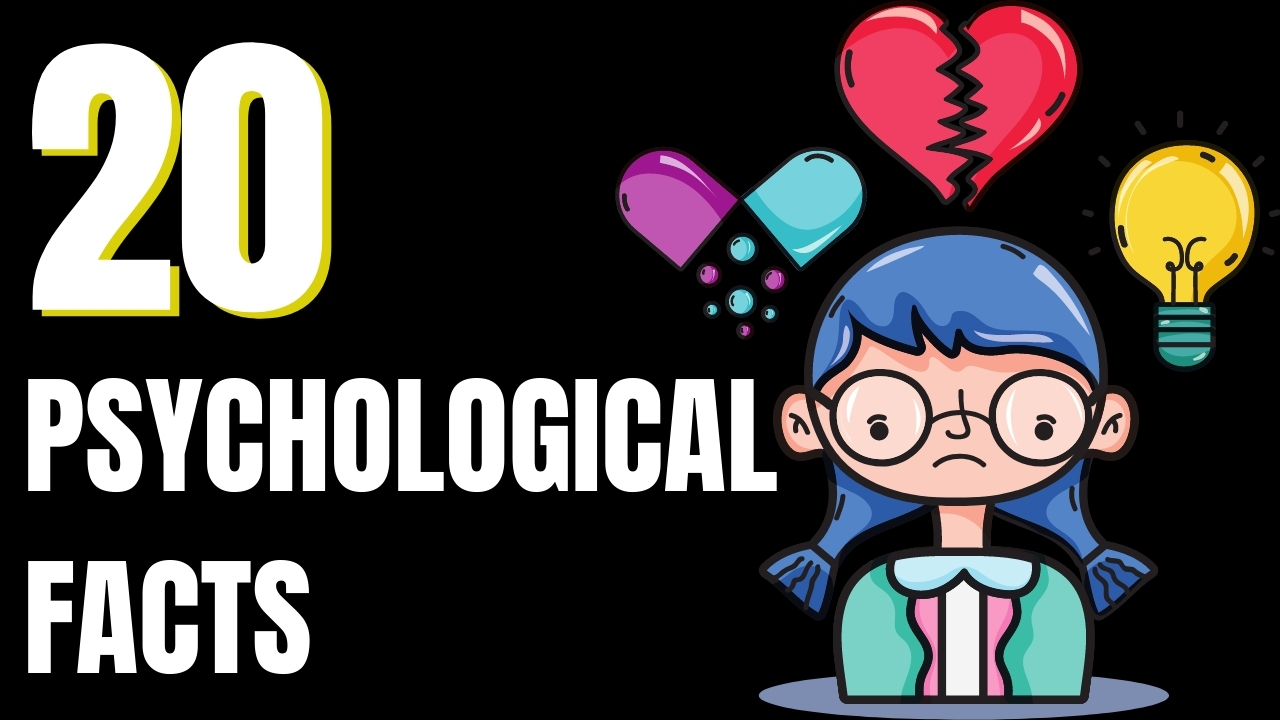Premium Only Content

20 Psychological Facts That Will Blow Your Mind | psychology facts about personality
20 Psychological Facts That Will Blow Your Mind.
The human mind is considerably complicated, which indicates new study comes out on a daily basis that aids brighten why were are the way we are. And also while some psychological studies offer us with relatively commonplace psychology truths others are absolutely enlightening.
we've assembled the psychology realities that describe human nature-- and just may shed some light on a few of the patterns you observe in yourself and others. From why you believe food tastes better when someone else makes it to why you constantly see human faces in motionless items, these are the astonishing psychology facts that clarify everything.
1. If we have a plan B, our plan A is less likely to work.
From time to time, it hurts to be prepared. In a series of experiments from the College of Pennsylvania, researchers discovered that when volunteers thought about a backup strategy before beginning a job, they did even worse than those who hadn't considered a plan B. What's even more, when they recognized they had alternatives, their inspiration for doing well the first time around dropped. The scientists emphasize that thinking ahead is a good concept, but you might be more effective if you maintain those plans obscure.
2. Fear can feel good—if we're not really in danger.
Not every person likes frightening motion pictures, however, for the people that do, there are a few theories as to why-- the main one boiling down to hormonal agents. When you're watching a frightening flick or walking through a haunted home, you obtain all the adrenaline, endorphins, and also dopamine from a fight-or-flight action, however no matter how frightened you feel, your mind acknowledges that you're not truly at risk-- so you obtain that natural high without the threat.
3. "Catching" a yawn could help us bond.
Why do you yawn when another person does, even if you aren't tired? There are a few concepts regarding why yawning is infectious, however among the leading ones is that it reveals empathy. Individuals that are much less likely to reveal empathy-- such as toddlers that haven't learned it yet or youths with autism-- are likewise less likely to yawn in response to someone else's.
4. We care more about a single person than about massive tragedies.
In an additional University of Pennsylvania research, one team learnt more about a little lady who was depriving to fatality, an additional found out about millions dying of appetite, and also a third learnt more about both situations. Individuals gave away greater than twice as much cash when becoming aware of the little girl than when hearing the statistics-- and also even the group who 'd heard her tale in the context of the larger misfortune gave away less. Psychologists think that we're wired to help the person in front of us, yet when the trouble feels as well large, we figure our little part isn't doing much.
5. Beginnings and ends are easier to remember than middles.
When individuals are asked to remember things from a checklist, they're more than likely to think about things from the very end, or from the very start, found one research study released in Frontiers of Human Neuroscience. The center gets muddled, which could also play into why you remember your employer wrapping up her discussion, yet not so much regarding the center.
6. It takes five positive things to outweigh a single negative thing.
Our brains have something called a "negativity bias" that makes us bear in mind trouble more than excellent, which is why you swiftly forget that your colleague complimented your presentation however keep home on the truth that a kid at the bus stop dishonored your shoes. To feel well balanced, we need at the very least a 5 to one provision of great to negative in our lives.
7. Food tastes better when someone else makes it.
Ever before wonder why that sandwich from the takeout put the street tastes far better than the ones you make at home, even if you make use of the very same components? One research released in the journal Scientific research located that when you make on your own a meal, you're around it so long that it really feels less exciting by the time you really dig in-- and that, ultimately, reduces your pleasure.
8. We'd rather know something bad is coming than not know what to expect.
Scientists who released their work in the journal Nature have located that it's less stressful to know something adverse will occur (e.g., there's no chance we'll reach a conference promptly) than when we do not know exactly how things will exercise (e.g., we could be in a timely manner besides). That's due to the fact that the part of our mind that predicts repercussions-- whether excellent or poor-- is most energetic when it doesn't understand what to anticipate. If stepping on the gas will certainly aid us defeat web traffic, we'll go through that stress and anxiety rather than just accepting that we'll need to create a respectable excuse when (not if) we're late.
9. We always try to return a favor.
It's not just good manners-- the "policy of reciprocity" recommends that we're programmed to want to help someone who's aided us. It probably established since, to maintain culture functioning efficiently, individuals require to assist each other out. Shops (and some frenemies) like to use this against you, providing free offers in hopes that you'll invest some money.
10. When one rule seems too strict, we want to break more.
Psychologists have actually researched a sensation called reactance: When people view particular flexibilities being eliminated, they not just break that rule, yet they break even more than they otherwise would have in an initiative to regain their liberty. This could be among the very best psychology realities to discuss why a young adult that can't use his phone in course will chew gum while stealthily sending a message.
11. Our favorite subject is ourselves.
Don't criticize your self-absorbed brother for discussing himself-- it's just the means his brain is wired. The reward centers of our brains illuminate more when we're speaking about ourselves than when we're talking about other individuals, according to a Harvard research.
12. There's a reason we want to squeeze cute things.
"It's so cute, I just was to smoosh it till it stands out!" That's called cuteness aggressiveness, and also people who feel it don't really want to crush that lovable pup. Research released in Frontiers in Behavioral Neuroscience discovered that when we're feeling bewildered by favorable emotions-- like we do when looking at an impossibly charming infant animal-- a bit of hostility helps us balance out that high.
13. Our brains try to make boring speeches more interesting.
College of Glasgow scientists discovered that in the same way that we listen to voices in our heads when we read aloud, our minds also "talk" over uninteresting speeches. If somebody is speaking monotonously, we'll subconsciously make it extra dazzling in our heads.
14. Some people enjoy seeing anger in others.
In one College of Michigan research study, individuals with high testosterone remembered details better when it was coupled with an upset face than a neutral one or no face, suggesting they located the mad glow rewarding. The researchers stated it can suggest that specific people take pleasure in making somebody else glow at them-- as long the flash of temper doesn't last long enough to be a danger-- which could be why that person in the office will not release that foolish joke at your expenditure.
15. We automatically second-guess ourselves when other people disagree.
In a well-known 1950s experiment, university student were asked to mention which of three lines coincided length as a 4th. When they heard others (who were in on the experiment) pick a response that was clearly incorrect, the individuals followed their lead and considered that same incorrect solution.
16. We aren't as good at multitasking as we think we are.
Research study released in the Journal of Speculative Psychology reveals that also when you believe you're doing 2 points at the same time, what you're actually doing is changing quickly between both jobs-- you're still concentrating on individually. No surprise it's so difficult to pay attention to your partner while scrolling via Instagram.
17. We're convinced that the future is bright.
Doesn't matter if you like where you go to now or not-- a lot of us have an "positive outlook prejudice" that convinces us the future will be better than the present, according to study in Existing Biology. We think we'll rise in our professions, never obtain separated, raise babies of kids, as well as live to a ripe seniority. Those may not all be practical for everybody, yet there's no damage in dreaming.
18. We (unintentionally) believe what we want to believe.
Humans are victim to something called verification predisposition: the propensity to translate truths in such a way that validates what we already think. So regardless of how many truths you throw at your uncle attempting to sway his political point of views, there's a likelihood he isn't going to budge. It's one of the psychology truths you'll just have to approve that you can not change.
19. Our brains want us to be lazy.
Evolutionarily talking, saving energy is a good idea-- when food was scarce, our ancestors still needed to be ready for anything. Sadly for any person seeing their weight, that still holds true today. A tiny research released in Existing Biology located that when walking on a treadmill, volunteers would automatically readjust their stride to shed less calories.
20. Being lonely is bad for our health.
Researchers located that the fewer close friends an individual has, the higher degrees of the blood-clotting healthy protein fibrinogen. The impact was so strong that having 15 pals as opposed to 25 was just as poor as cigarette smoking.
-
![[TOP 8] SECRET MOON FACTS WILL BLOW YOUR MIND!](https://1a-1791.com/video/s8/6/j/F/i/z/jFizb.0kob.1.jpg) 13:22
13:22
Edge of Wonder
3 years ago[TOP 8] SECRET MOON FACTS WILL BLOW YOUR MIND!
4.09K31 -
 4:49
4:49
Dniclove123
4 years ago5 facts about your cells
2921 -
 3:16
3:16
YeMeN Spotlights
3 years ago $0.01 earned7 Facts About Yemen
284 -
 8:48
8:48
Sideserf Cake Studio
3 years ago $11.64 earnedMaking a Realistic Buffalo CAKE that will blow your mind
87.8K98 -
 35:23
35:23
Ben Shapiro
3 years agoFacts Don’t Care About Your Pronouns | Ep. 1204
9.35K86 -
 9:59
9:59
TOP INFORMATION - TECHNOLOGY
3 years ago $0.04 earned✅8️⃣ INSANE MACHINES & INVENTIONS That Will Blow Your Mind
5421 -
 4:33
4:33
Sideserf Cake Studio
3 years ago $3.46 earnedMaking a realistic coffee mug CAKE that will blow your mind
97.4K49 -
 3:55
3:55
Jimmo4life
3 years ago $0.05 earned10 Facts about French Bulldogs
259 -
 10:10
10:10
TOP INFORMATION - TECHNOLOGY
3 years ago $0.01 earned✅ 8 Amazing Food Processing Machines That Will Blow Your Mind
119 -
 1:26:23
1:26:23
vivafrei
15 hours agoChinese and Indian INFILTRATION in Canadian Government? Live with David Krayden! Viva Frei Live
201K120